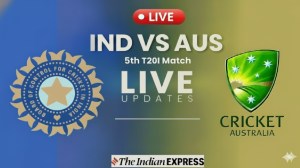Non-resident parliamentarians
The founding fathers did not intend Rajya Sabha to be Lok Sabha lite

On one point there is hardly any scope for doubt. Most people in this country — indeed an overwhelming majority of them — respect and rely on the higher judiciary far more than they trust any of the other institutions that comprise the republic’s infrastructure. (About the subordinate judiciary the less said the better, but that’s a separate story.)
Over the years — leaving behind the lapses of the Emergency era — the Supreme Court and various high courts have extended the citizen’s rights, put a stop to the executive’s excesses while pulling it up for its dereliction of duty, and thrown out dubious laws passed by legislatures. It is a different matter, however, that political parties able to muster the necessary two-thirds majority in the two Houses of Parliament have been over-anxious to overturn the courts’ verdicts by casually amending the Constitution. Witness, the OBC bills.
To be fair, it must be acknowledged that there are those who believe, not entirely without justification, that the higher judiciary sometimes extends its powers by using its judgments to encroach on the jurisdictions of the legislature and the executive, thus putting at risk the delicate balance the Constitution provides for. One such occasion was in the mid-nineties when the apex court ordered the director of the Central Bureau of Investigation (CBI) not to consult the prime minister of the day while investigating and prosecuting the notorious Hawala case. However, the pertinent question is, why did the public at large applaud the court and jeer its critics?
The answer is simple. All the incriminating documents — including evidence that the Hawala money was going to the high and mighty on the one hand and to Kashmiri militants on the other — had been on the then PM’s desk for more than four and a half years. Then suddenly, just before the general election, he dusted the file and arraigned in courts of law a whole array of friends and foes, ranging from Buta Singh to L.K. Advani. All the accused protested that the governmental action was motivated by crass partisan and personal politics. And so it had eventually turned out to be when the Supreme Court gave its final verdict.
Against this backdrop, one has to submit, with the deepest respect for the Supreme Court, that its latest judgment, upholding the elimination of the domicile requirement for election to the Rajya Sabha, has come as a great disappointment. Their lordships would do well to review this verdict on their own, without waiting for someone to file a revision petition. The unanimity of the five-member bench is neither here nor there. For, the matter is one of high principle and involves the preservation of the federal parliamentary system that we have sensibly chosen for ourselves.
Not to put any gloss on it, the sad situation now is that the Rajya Sabha has ceased to be what the founding fathers had envisaged it to be — the Council of States. In other words, this Upper House in New Delhi was intended to be more like the Senate in the United States than akin to the House of Lords in England even though it is the Westminster pattern we have opted for.
Any Indian can get elected to the Lok Sabha from any of the 543 constituencies in this country of continental size. For the membership of the Rajya Sabha, the electorate is confined to the state assembly, and if states’ rights are to have any meaning, it stands to reason that those to be sent to the Council of States from any state ought to be from among its residents. The framers of the Constitution prescribed this not in a fit of absent-mindedness but with due regard to the duties and obligations of what has come to be called the Rajya Sabha.
During the first 20 years of Independence or a little longer the arrangement worked reasonably well. The trouble began in 1967 when the Congress lost not only Tamil Nadu in the south but also nine states in the north, engendering the comment that one could travel all the way from Calcutta to Amritsar without having to traverse a single inch of Congress-ruled territory. Some Congressmen had to ‘migrate’ nominally to states where their party was in power to enter the Rajya Sabha. On one occasion Pranab Mukherjee was elected from Gujarat.
Later, such stratagems became more numerous and more embarrassing. The domicile requirement was still on the statute book. So, came a day when the redoubtable Lalu Prasad Yadav was seen getting Inder Gujral’s nameplate fixed on a modest house in Patna. There was no other way to get him elected to Parliament. Later, it was even more heart-rending to see Manmohan Singh, with his impeccable record, having to claim that he was a resident of Assam.
It was to get rid of such awkward situations, arising all too frequently, that the shortcut of abolishing the domicile requirement was adopted. There was widespread dismay across the country. But there was hope that the Supreme Court would not sustain this political skullduggery by self-seeking politicians of all hues. My two colleagues, Kuldip Nayar and Inder Jit — the first a former member of the Rajya Sabha and the second of the Lok Sabha — went to the apex court more or less confident that their plea to restore the Rajya Sabha to its original role would be accepted. Alas, this hope has been dashed, for the present at least. Nor is this all.
The Rajya Sabha has not only ceased to be the Council of States but also it no longer is the House of Elders or even a ‘revising chamber’ that it was expected to be. All political parties have cynically conspired to convert it into a smaller replica of the Lok Sabha, with the additional bonanza that the passage to the Rajya Sabha does not involve fighting a gruelling election involving more than a million voters. No wonder, faithful party hacks and financiers of various parties or party bosses are having a field day. Surely this is not what the apex court wants to foster.
The writer is a well-known political commentator



- 01
- 02
- 03
- 04
- 05



























